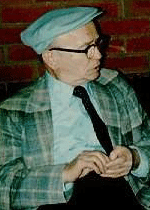Reshevsky Samuel Herman (26.11.1911)
 US Grandmaster (1950), journalist and writer born in Poland.
US Grandmaster (1950), journalist and writer born in Poland.
He learned to play chess at the age of 4 from his father, soon becoming a child prodigy. As a 6-year-old boy, he traveled throughout Poland giving simultaneous exhibitions against 20 or more players and losing very seldom; later he made the same tour within Europe. At the age of 8, his family moved to America. For two years, he improved his skills, giving simultaneous performances traveling in America, losing only 8 out of 1,500 games.
In October 1922 at the age of 11, participated for the first time in a tournament, where he finished the last, but he won one game from Janowski. At 12, having received some private tuition, he began to attend ordinary school. He decided to choose accountancy for his future profession, and in 1934, he graduated from the University of Chicago.
In the period 1935-53, he played in 14 tournaments, won half of them, and only once he came in lower than third place. In 1935, he participated in many tournaments in the USA and commenced his career at the GM level after winning first place at Margate ahead of Capablanca. In Nottingham 1936, he performed third, tied with Euwe and Fine, behind Botvinnik and Capablanca. In 1937, at Kemeri he showed the first result equal with Flohr and Petrov, followed by Alekhine and Keres. The same year at Semmering Baden, he was third equal with Capablanca, behind Keres and Fine. In 1937-38, he was the winner in the Hastings Tournament, and in 1938, shared fourth place with Euwe and Alekhine.
Reshevsky was six times the American Champion in 1936, 1938, 1940, 1942, 1946 and 1969, and defended twice his title in the matches with Horowitz, scoring +3=13 in 1941 and with Kashdan with a score of +6=3-2 in 1942. He tied for the title in 1972 and finished second in a playoff match with Byrne, ahead of Kavalek. Being a very religious man, he decided to pay more attention to his family and from then, he took part in the chess events less often. Nevertheless, he played in the Open US Championship in 1944 and won.
In 1945, he won in a Pan-American Championship in Los Angeles, and in 1946, he won again the US Championship. In 1948 he played in the Hague/Moscow Tournament and shared third place with Keres, behind Botvinnik and Smyslov. After that, he was twice a Candidate. In 1950 he decided to take part in the in the Candidates’ Tournament, which was held in Budapest, but the American State Department refused his traveling there, and thus, he lost a chance to become a challenger for the title. He participated in many tournaments and played matches preparing himself for the next championship cycle. In 1950 he came in second in Amsterdam behind Najdorf, and then in 1951, he was the winner in the New York Tournament. In matches, he beat Gligoric in 1952 with a score +2=7-1 and Najdorf in 1952 with a score (+8=6-4), and in 1953, with a score +5=9-4. He succeeded in being the second equal with Bronstein, Keres, behind Smyslov. He participated in the match USSR-USA in 1955 and beat Botvinnik with a score 2,5-1,5. He was also a member of the American team during eight Olympiads, and in 1937 also, when the US team won the gold medal. He continued to play in some strong tournaments, being equal first with Gligoric at Dallas; in 1960, he came in equal first with Korchnoi at Buenos Aires, won at Natanya in 1969 and his sixth US Championship in the same year. He played a match with Benko, with a score +3=5-2 in Reshevsky’s favor. In 1961, he played a match with Fischer, but it was stopped when the score was +2=7-2. In 1964, in the interzonal playoff, Reshevsky lost +0=1-2 to Portisch; in 1967, he was equal sixth in the Sousse Interzonal, but lost to Korchnoi in the quarterfinals. At the age of 72, he won the Reykjavik Open in 1984. In a very strong veterans’ tournament in Moscow, he finished at 50% and drew a four-game rapid chess match with Smyslov.
His style of play is characterized by solid openings and a severe positional game. Botvinnik said about him: “Reshevsky was a striking and original player. He calculated variations excellently and had an extraordinary positional understanding, but also a typical practical player, with the added defect of suffering from an incurable form of the time-trouble disease. This latter factor was the reason why the results were not even better”, but nevertheless he beat seven World Champions: Lasker, Capablanca, Alekhine, Euwe, Botvinnik, Smyslov and Fischer. Reshevsky spent comparatively less time studying opening theory and often consumes a lot of this in the first part of the game with the result of hard zeitnot. He preferred a closed position in which his talent for a tactical position was shown.



